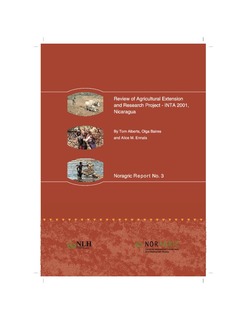| dc.description.abstract | This Report is a review of the Norwegian support to INTA, the Nicaraguan Institute for Agricultural Technology. It was established in 1993 with major support from the World Bank but Swiss Aid, COSUDE, also played an important role. INTA is a public entity with a major mandate in agricultural extension and research.
Norway has supported research and extensions activities since the 1980s and also a special project for female farmers. At the request of the Government of Nicaragua an agreement was signed with Norway in 1996. The Norwegian support to INTA consisted of two major components, namely:
• Support for the Process of the Generation and Transfer of Agricultural Technology and Training; and
• Training and Technical Assistance for Women Farmers. - PROCATEPA
Although the first Project has specific objectives and activities over time Norwegian support became more of a core (budget) support to INTA as such. This was probably a positive development since it provided INTA with needed flexibility in allocating donor funding to priority activities. For this reason, instead of trying to analyse the NORAD support, a number of key issues was identified and analysed. The PROCATEPA project was primarily a NORAD supported project and was reviewed in some detail.
NORAD support to INTA has been small compared to the over-all budget and the funding provided by the World Bank. Nevertheless, Norwegian support has been substantial. In total (1997-2000) about USD 3.8 million was provided. Of this sum about USD 1 million was for PROCATEPA.
INTA has a well developed system for monitoring its activities. A large amount of information is collected yearly on the different aspects of INTA activities. Apart from regular reviews there has only been one evaluation and it was carried out by the National Agricultural University in 1997. The available information does not permit an assessment of the impact of INTA on technological innovations of the beneficiaries. Having said this, available data and the interviews with stakeholders suggest that INTA has had a positive impact on the technological development and the standard of living of the beneficiaries.
Training of INTA staff, particularly upgrading extension agents to a university degree, has been a priority area. NORAD's support was particularly important in this respect. With the assistance of INTA staff some data processing was carried out. Between 1997 and 2001 the percentage of INTA staff members with a university degree actually declined from 34 to 28 percent. A significant number of INTA students was either fired our resigned. Moreover, there was a large number of un- or underemployed agronomists in Nicaragua. And only 13% of the scholarships were awarded to female students. There were good reasons to assign priority to extension and to secure that research activities supported extension. There was a positive interaction between research and extension within INTA. Nevertheless, the issue of research training has been virtually ignored by INTA and there is not one PhD holder within INTA. In summary, the benefits of INTA support (and NORAD's) to training do not seem to justify the costs and there was a strong gender imbalance.
Although there was a strong gender imbalance with respect to the scholarships awarded there has been a slight improvement in the gender balance within INTA. While the share of women within INTA only increased slightly between 1997 and 2001, (from 27 to 28 percent), the share of women with university education increased from 19 to 23 percent.
NORAD's support to PROCATEPA has been successful in many respects. While in the past the focus was on providing special support to women projects (WID - Women in Development) INTA has developed a framework for providing support to families with a focus on women priority areas. Significant methodological development and training have been carried out. In this way there has been a significant mainstreaming of gender issues within INTA.
As of 2000 a new Program me for technological development was introduced. It has a long time horizon, 16 years. The lead donor has been the World Bank. But IFAD and Swiss Aid are contributing as well. During the planning phase, Norway explicitly stated its wish to participate in a Sector Wide Approach (SWAP). However, for several reason such as the weakness of the Ministry of Agriculture to take a strong co-ordinating role, the lack of interest of the World Bank to develop a jointly funded national programme, and the desire of INTA to continue to receive Norwegian bi-lateral funding Norway never became an active partner in the development of the new programme.
In summary, since its creation in 1993, INTA has become an important institution in agricultural applied and adaptive research and extension. Norwegian support to INTA has been important in this respect and not least to gender mainstreaming.
It is recommended, in line with SWAP policies, that in the future, Norway should not continue with bi-lateral funding. In this context, there are two basic options, either to conclude NORAD's present support to agricultural research and extension or to engage in a long term programme funding with other donors, not least the World Bank. | nb_NO |

